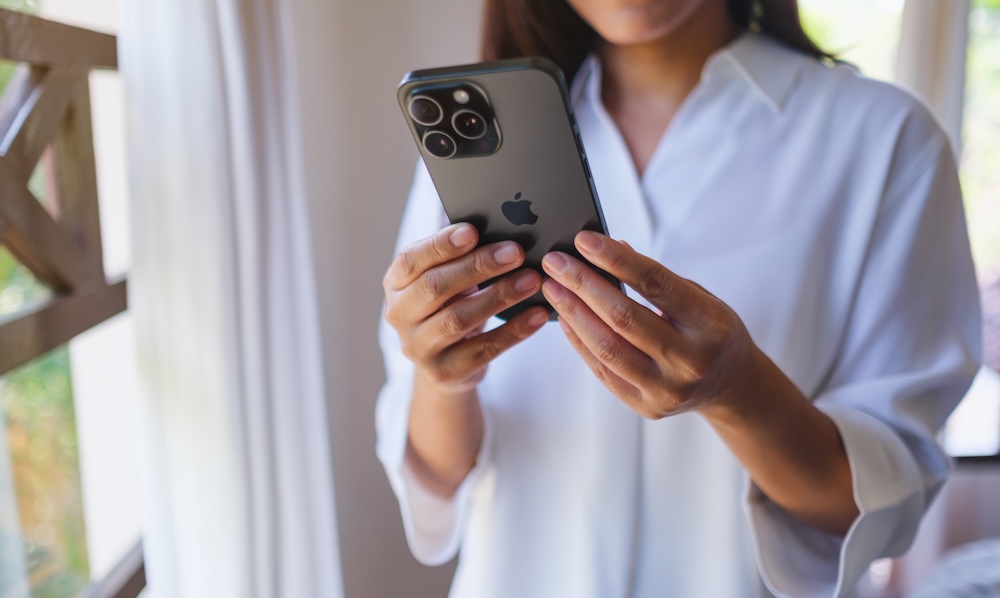Warning: Don’t Trust Your iPhone to Keep You Safe From Scams
 Farknot Architect / Adobe Stock
Farknot Architect / Adobe Stock
Toggle Dark Mode
Online scams are rampant. Everyone knows this. This year alone, we’ve highlighted toll road and voice cloning fraud, health insurer and law enforcement impersonation, and smart home device hacking.
Today, a new warning has emerged, aimed directly at iPhone users, but it doesn’t come from law enforcement or another FBI public service announcement. Instead, it comes from a cybersecurity company known for its anti-malware and antivirus products.
Today, Malwarebytes Labs published a study suggesting iPhone users are more reckless and less protected online. While there’s no single reason underlying the study’s findings, iPhone users (55%) were slightly more likely to agree with the following statement compared to their Android counterparts (50%): “I trust the security measures on my mobile/phone to keep me safe.”
According to Malwarebytes’ research:
That trust could have an adverse effect, in that iPhone users do not feel the need to change their behavior when making online purchases, and they have less interest in (or may simply not know about) using additional cybersecurity measures, like antivirus.
Here are some interesting tidbits from the study that led Malwarebytes to its conclusion that iPhone users are more “reckless” than Android users, as they tend to trust Apple to keep them safe. They surveyed 1,300 adults in the US, UK, Austria, Germany, and Switzerland and found the following:
- 63% of iPhone users signed up for text messages with their phone number to receive a coupon, discount, free trial, or other promotional offer, compared to 55% of Android users.
- 41% of iPhone users “sent a DM (direct message) on social media to a company or seller account to get a discount or discount code,” compared to 33% of Android users.
- 47% of iPhone users purchased an item from an unknown website or supplier solely based on pricing, compared to 40% of Android users.
- 70% of iPhone users scanned a QR code to complete a purchase, while 63% of Android users did the same.
- 21% of iPhone users reported using security software on their iPhone, compared to 29% of Android users.
- Only 19% of iPhone users use an ad blocker compared to 27% of Android users.
- 35% of iPhone users “choose unique and strong passwords for accounts” compared to 41% of Android users.
Finally, the survey found 53% of iPhone users have fallen victim to a scam compared to 48% of Android users.
While these margins are slim, and even Malwarebytes admits that some of the figures may be “benign,” the results underscore that your Apple device may not be inherently safer than any other smartphone, whether it is an Android or otherwise. We know Apple goes to great lengths to prioritize security and privacy. However, the ultimate responsibility remains with the user to be aware of and recognize common scams, as well as to be knowledgeable about how to deal with them. The iPhone is the most popular smartphone on the market based on sales and usage worldwide. Naturally, it’s most targeted by hackers.
We can no longer rest on our laurels no matter how we choose to browse, bank or chat. Cybercriminals know that mobile devices are a fruitful gateway to scams and threats. We need to be aware and skeptical of everything from text messages and search results to email attachments and links.
Michele Sherwood, VP of product at Malwarebytes
Hopefully, this study serves as yet another reminder to practice important security principles:
- Remain vigilant and skeptical when it comes to unknown texts, calls, or emails.
- Never click the links in suspicious communications, or dial the number you may be prompted to call. Always verify the organization’s publicly available contact information and call that number instead.
- Use strong passwords and Multi-Factor Authentication wherever possible.
- Regularly update your iOS as prompted by Apple.
- Consider using third-party antivirus and security tools. VPNs and iCloud Private Relay are great tools for protecting your privacy when browsing on public Wi-Fi networks, but always remember that they’re not a replacement for anti-malware, anti-virus, and firewall apps.
We’ll do our best to keep you informed about the latest scammer tricks, but ultimately, the responsibility is yours.








